Neutra’s 900-square-foot McIntosh house
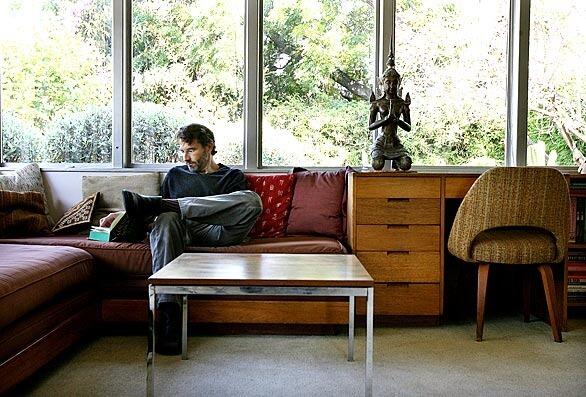
By David A. Keeps
You could say that architect John Bertram lives and breathes Richard Neutra. In the past decade, he has renovated significant residences by modernist Neutra (1892-1970), one of Southern California’s first starchitects. His personal residence is one of Neutra’s lesser-known works, the split-level, 900-square-foot McIntosh house, built in 1939 in Silver Lake.
“For me, modernism was a high water mark of architecture and Neutra established a rigorous set of rules for designing houses that are clear, precise, linear and dynamic,” Bertram says. “In Los Angeles, where the climate permitted it, his integration of indoor and outdoor spaces set a standard that people still look for in houses today.”
Here Bertram sits in the living room, which has two long window walls delineated by a built-in L-shaped banquette, writing desk and bookcase made of mahogany. Despite these thoughtful, space-saving appointments, the redwood-clad house “has a strange rusticity to it,” Bertram says. “It’s almost like a cabin.” (Christine House / For The Times)
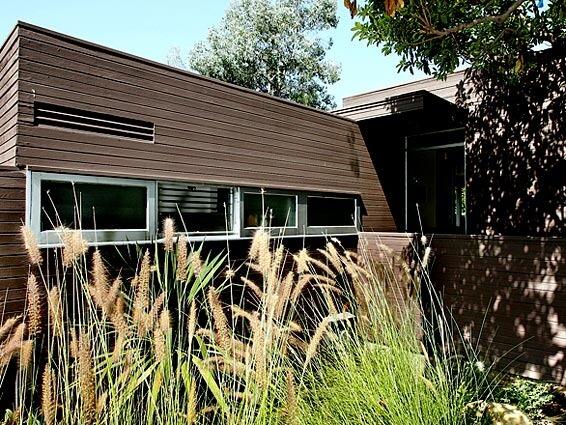
In her definitive book, “Neutra: The Complete Works,” architectural historian Barbara Lamprecht describes Bertram’s residence: “This spare, lean house steps back from its quiet Silver Lake street in a series of low, compact volumes wrapped in horizontal redwood siding. The disparity between private and public agendas is extreme: the house is irrevocably closed to the public and exuberantly open on the view side.”
Lamprecht adds that there are not many wooden houses by Neutra, but the architect’s departures from concrete and steel tended to be “incredibly sophisticated, introducing the appropriation of wood as a perfectly reasonable vocabulary for modernism.” The building also achieves the streamlined sweep that belies its small scale, with long and thin rectangular lines echoed in the air vents, the band of windows and a fixed-glass transom over the door. (Christine House / For The Times)
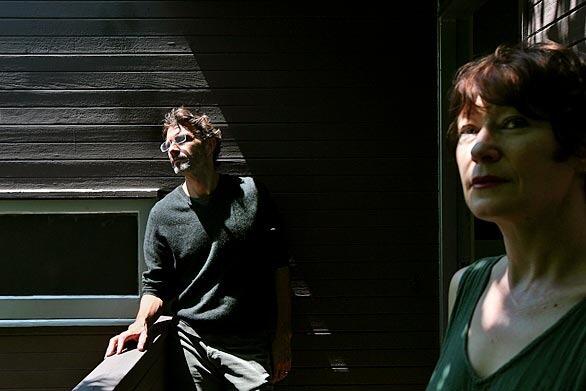
Bertram, left, stands on the front porch with his wife, the actress and writer Ann Magnuson. She purchased the house after the 1992 Los Angeles riots. “The area was still dicey then, but the price was right,” she says.
The couple met in 2000, when Bertram tagged along with a friend to a birthday celebration at the performer’s house.
“I wanted to go because it was a Neutra house, but the party was so insane, we only spoke briefly,” recalls Bertram, who wed Magnuson in 2002. “The next morning my friend and I came back to help clean up, and Ann mentioned she wanted to get new cushions for the built-in sofa. I brought over some fabrics on another visit, but by then I was definitely more interested in her than reupholstering.” (Christine House / For The Times)
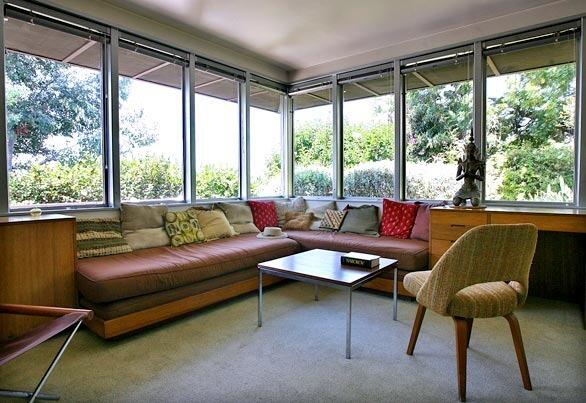
Along with other modernists, Neutra was driven by a desire to bring in as much air and light into a house as he could and unite indoor and outdoor spaces. Bertram likens this room to a conservatory or screened-in porch.
“In traditional homes, you get a plaster interior with punched-out doors and windows and trim to cover up the seams,” he says. “With Neutra, you could have a whole wall of glass panes.” Here, a coffee table in the style of Florence Knoll and a vintage upholstered chair by Eero Saarinen are part of the couple’s decorating sensibility, one that is in keeping with the post-World War II modern aesthetic.
“Because of the open layout and the built-ins, you really don’t need a lot of furniture,” Bertram says. (Christine House / For The Times)
Advertisement
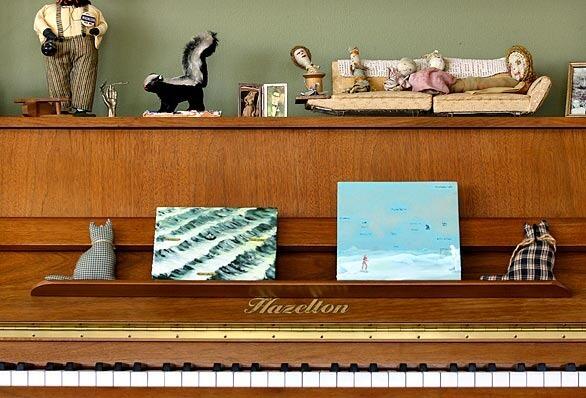
Magnuson’s upright piano serves as an easel for a collection of arts and crafts. The paintings are by Dan Attoe, the dolls and the couch on top were fashioned by Magnuson’s grandmother. The ivories get an occasional workout at gatherings. “I had a surprise birthday party for Ann and had this wonderful pianist Andy Chuckerman come and play show tune versions of Led Zeppelin and Queen,” Bertram says. (Christine House / For The Times)
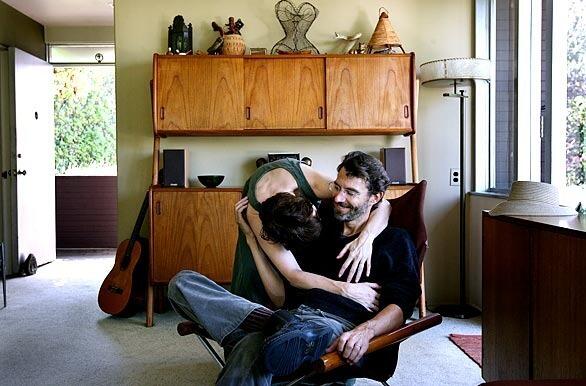
In the living room, a vintage floor lamp flanks a Danish credenza with a suspended hutch that holds a sound system and travel souvenirs. Bertram sits in an original 1958 Ny rocking chair by Takeshi Nii. “I have redone other Neutra houses, replacing things with more exotic materials and making it high-maintenance,” Bertram says. “I used to come home thinking I wanted to do the same here. Having lived in it, I don’t see that as a necessity.
“We have both embraced living in this house, appreciating the parts that are really great and accepting the things that aren’t. We both agree that it’s not a showplace; it’s the place where we live. It’s not precious, and it continues to serve its modest function.” (Christine House / For The Times)
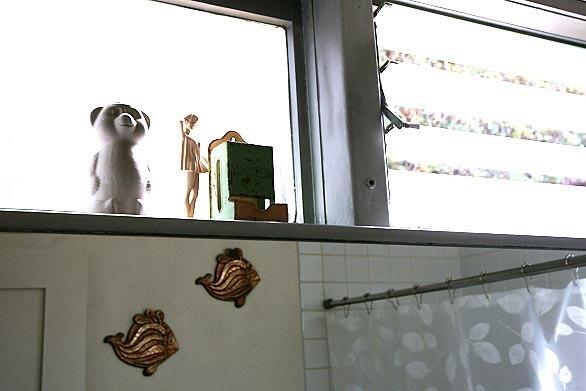
Magnuson’s work as a performance artist in New York during the 1980s manifests itself in original bathroom decorations, including plaster gold fish and a 1960s Campus Cuties doll standing next to a matchbox holder.
“The bathroom is completely tiny, probably the minimum size it could be with the original tub,” Bertram says. “And yet it works. I never feel like I wish we had a bigger bathroom or a second one.” (Christine House / For The Times)
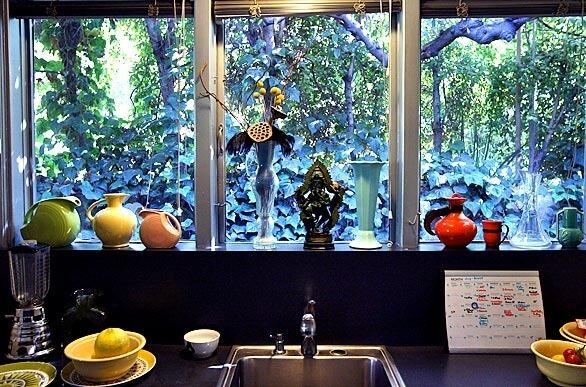
The bathroom is small, the master bedroom is a mere 11 by 11 feet, and the kitchen is only 84 square feet. “I don’t know how much Neutra cared about kitchens,” Bertram says. Indeed, the kitchen is little more than a hallway. One side has a range with a vent concealed by the upper cabinets. The other side houses the sink below a ribbon of windows, another Neutra signature. On the sill, a collection of midcentury Bauer and Fiestaware pottery share space with vases and a statuette of the Hindu deity Ganesha. (Christine House / For The Times)
Advertisement
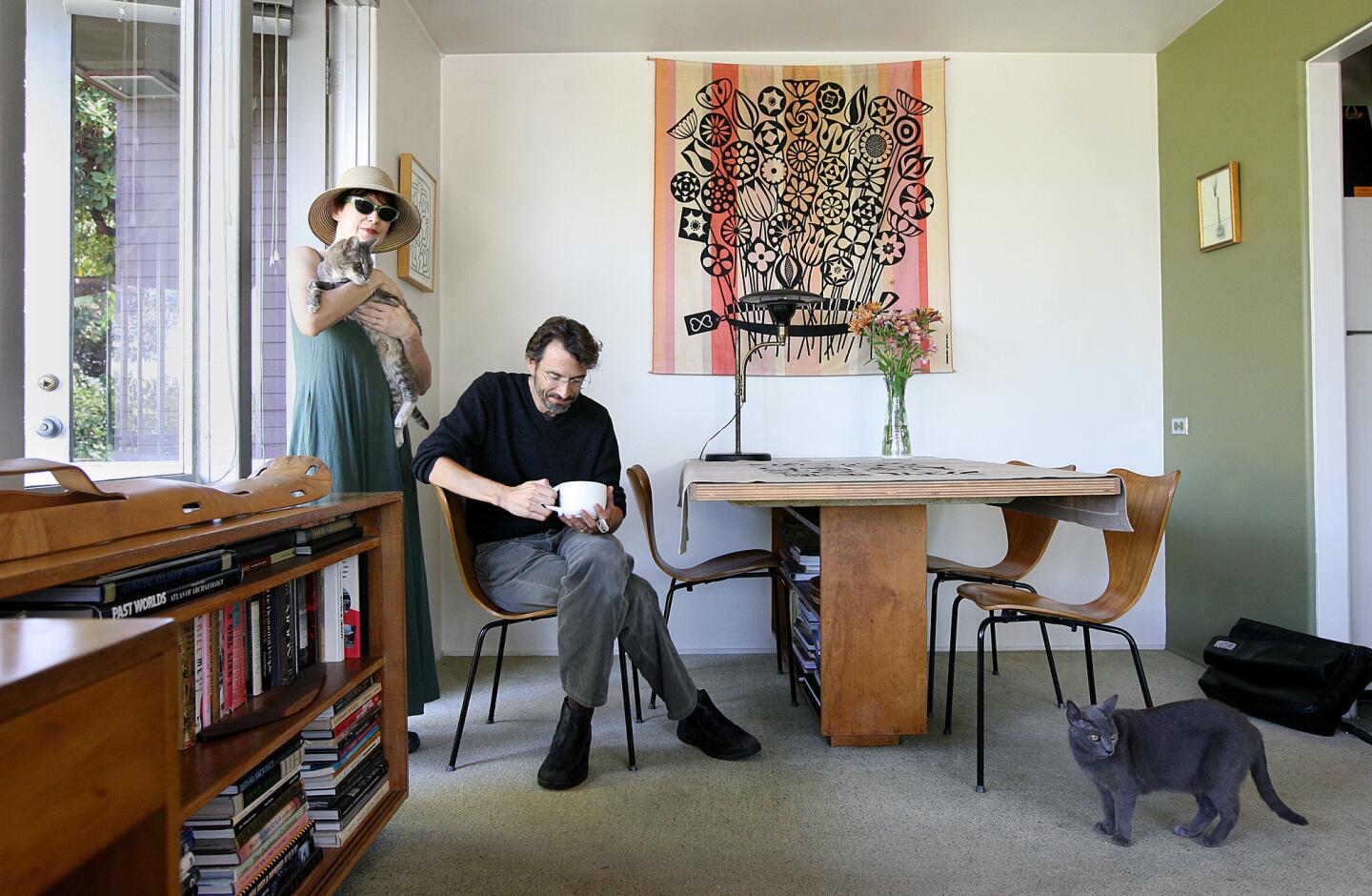
The dining area is just off the kitchen. Neutra’s built-in table is composed of a Douglas fir pedestal and a 1.5-inch laminated plywood top, a replacement for the original. The cat Christy Turlington pauses on the wall-to-wall carpeting in a garden green, the couple’s favorite color, which also appears on accent walls in the dining and living areas. Above the table is an Alexander Girard textile that Magnuson, holding her feline friend Nixon, purchased at Skank World in Los Angeles. (Christine House / For The Times)
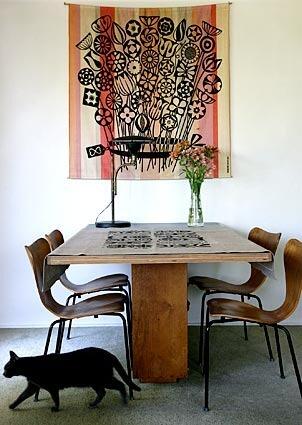
The dining table can accommodate six in a pinch. The chairs are vintage metal-and-wood Series 7 chairs by Danish designer Arne Jacobsen. The printed tablecloth is one of Magnuson’s souvenirs from a visit to Kiruna, Sweden. Other linens are stored in the table’s pedestal, which doubles as an open shelving unit. (Christine House / For The Times)
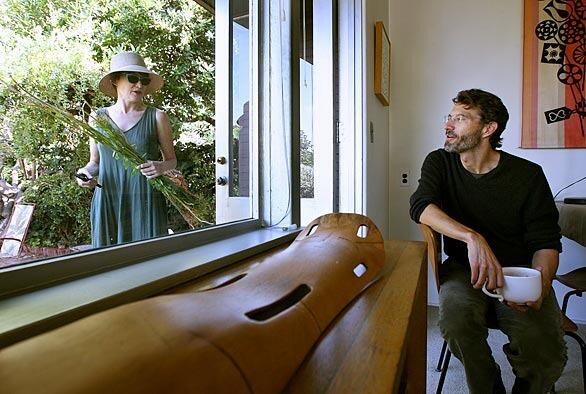
From the dining area, a door leads out to a patio and stairs down into the garden. In the foreground, a bent plywood splint designed by Charles Eames sits on the built-in bookcase. Says Magnuson: “One of the drawbacks of having an ‘architecturally significant’ house is that there is an expectation that you have the ‘right’ furniture, carpet, lamps, even landscaping. While John was well versed in the do’s and don’ts of midcentury modern restoration, he was refreshingly laid back about it.” (Christine House / For The Times)
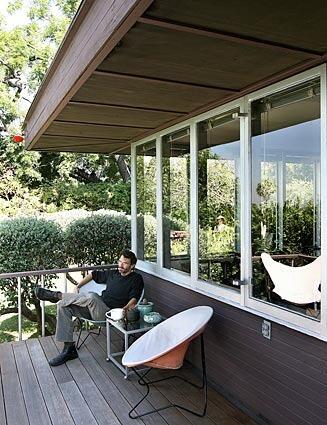
The deck, one of Bertram’s favorite places to read, offers a view from the Getty Center to the Equitable Building at Wilshire Boulevard and Vermont Avenue. The underside of the extended eaves underneath the flat roof are covered in full-length mesh screen ventilation panels to keep the house cool, a Neutra innovation.
A previous owner had extended the deck. “It’s great to have that extra space, but it obstructs the view from the master bedroom, which I have a real problem with, plus you lose out on being able to look down from the deck to the lower walkway underneath it,” Bertram says.
He restored the deck in planks of mangaris, a denser material than redwood and used a Deckmaster fastening system that eliminates screws or nails on the top surface. (Christine House / For The Times)
Advertisement
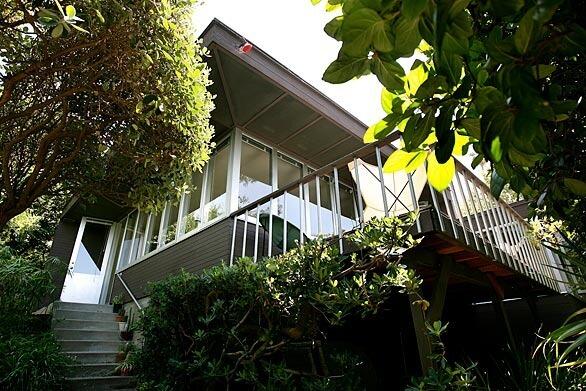
The deck and L-shaped window wall of the house photographed from the bottom of the sloped property. “Neutra was a complete master at finding the right site for building on a lot,” Bertram says. When framed by a guava and persimmon tree, “there is this wonderful perspective that makes the house feel much more grand than it is.”
The deck railing and silver-painted wooden window posts add vertical elements to a house with strong horizontal lines. “There are two theories about why Neutra painted the posts silver,” Bertram says. “One was that the budget couldn’t afford steel. The other is that it tends to disappear, contributing to the feeling of transparency created by the windowpanes.”
More midcentury home tours: Join the party inside a Gregory Ain classic . Peek inside the remodel of a Greta Magnusson Grossman gem . Or see the thought-to-be-lost Harpel house by John Lautner .
Back to L.A. at Home (Christine House / For The Times)



